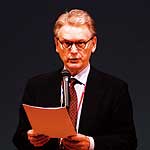
|
Workshop
áT
Rethinking the Nuclear Umbrella
-The Responsibility of Nuclear-Dependent Non-Nuclear Countries-
| Coordinators |

|
 |
Hiromichi Umebayashi
(Japan, Special Advisor, Peace Depot) |
Regina Hagen
(Germany, Abolition 2000) |
Panelists
Henrik Salander
(Sweden, Chair, Middle Powers Initiative)
Yi Kiho
(Korea, Coordinator in Korea, Parliamentary
Network for Nuclear Disarmament)
Alyn Ware
(New Zealand, International Peace Bureau)
Tadashi Inuzuka
(Japan, Parliamentary Network for Nuclear
Disarmament)
Keiko Nakamura
(Japan, Secretary General, Peace Depot) |
|
Hiromichi Umebayashi and I, Regina
Hagen, were the coordinators of Workshop I, under the
title of "Rethinking the Nuclear Umbrella -Responsibility
of Nuclear-Dependent Non-Nuclear Countries-".

Henrik Salander |
The topic of Workshop I was the "nuclear
umbrella" and the way in which dependent countries
plan on preventing or advancing nuclear disarmament. Ambassador
Salander from Sweden started out by defining extended
nuclear deterrence as nuclear security guarantees extended
from the United States to other countries such as NATO
allies, Japan, the Republic of Korea, and others. The
nuclear umbrella has two components in order to be credible:
the technical, that is the "hardware", but also
the political. It is an open question to what kind of
threats extended deterrence pertains. To a nuclear attack
only? Or also to others such as biological or conventional
ones? The panel was in agreement that the nuclear umbrella
has probably prevented many countries from developing
their own nuclear weapons capabilities, and has thus helped
to limit the numbers of nuclear weapons countries.
However, the drawback to this is that the purported security
dependence of the states under the nuclear umbrella now
provides the United States with one rationale for maintaining
safe, secure, and reliable nuclear arsenals, and therefore
is an obstacle to nuclear disarmament.
One case in point is Germany, where 20 nuclear bombs are
still deployed. I am reported that this arrangement is
covered by the so-called "Strategic Concept"
of NATO. Germany has now announced that it asks for withdrawal
of the remaining nuclear weapons from Germany. At least
one other nuclear-sharing country in Europe is supporting
such withdrawal. And it is believed that the others would
not oppose. Withdrawal would dramatically extend the effectually
existing nuclear weapons-free zone across central and
eastern Europe. It might also open the path to negotiations
between the United States and
Russia on disarmament of their tactical nuclear arms.

Yi Kiho |
The Republic of Korea has no formal
nuclear-sharing arrangement with the United States, but
is under its umbrella. Yi Kiho elucidated the three-fold
character of the relations South Korea has in East Asia
and beyond. It is a relationship of states; of capital,
that means trade; and of civil society. In all these spheres,
the main partners of South Korea are Japan, China, and
the United States. A lot of multilateral agreements are
already in place in East Asia, among them is GPPAC, the
Global Partnership for the Prevention of Armed Conflict.
A new component in this tightly knit network would be
a nuclear weapons-free zone between Japan and Korea.

Keiko Nakamura |
Keiko Nakamura from Japan pointed
out that both the nuclear weapons states and the nuclear-dependent
states share a similar mindset: they are stuck in Cold
War thinking. The U.S. should be aware of the major security
dilemma: the more one country expands its military power,
the more its adversaries will attempt to strengthen their
own military power in turn. Peace Depot has in the past
years advocated a "3+3"proposal under which
North Korea, South Korea, and Japan would create a nuclear
weapons-free zone, and China, Russia, and the United States
would agree to respect it.

Alyn Ware |
Establishment of such a nuclear weapons-free
zone creates a sophisticated machinery for negotiations
and consultations, an important means to build up trust
among the participants. In support of such an approach,
Alyn Ware from New Zealand questioned the viability of
the extended deterrence concept for meeting global security
needs. Alyn used the image of "Spaceship Earth,"
as proposed by Buckminster Fuller. "When we view
the earth as a spaceship," Alyn asked, "would
it really make sense to try to militarily protect its
individual compartments? It makes more sense to protect
it as a whole." New Zealand is a good example of
the positive role which states that turn their back on
the nuclear umbrella can play in promoting disarmament.
The country helped to negotiate a nuclear weapons-free
zone in the Pacific. It helped to establish the New Agenda
Coalition. And it helped to bring the nuclear weapons
issue to the International Court of Justice in 1996. Signals
from allied countries to U.S. President Barack Obama that
they don't consider the nuclear umbrella as crucial for
their security, which helped the United States administration
to count a cause for the renewal of the U.S. arsenal.

Tadashi Inuzuka |
Taking up this thought, Senator Inuzuka
from Japan pointed to the importance of parliamentarians'
involvement in the discussion. He also said that the letters
sent by Japan's Foreign Minister Katsuya Okada to U.S.
Secretary of State Hillary Clinton is highly welcome,
and the letter signed by 200 Japanese parliamentarians
supporting a change in nuclear policy will hopefully also
make an impact.
Generally, it was the idea that rather than perpetuate
the war system, which was a discussion and response to
Henrik Salander's proposal that maybe an extended conventional
deterrence could replace the nuclear one and would be
more credible. In response to this both the panelists
and people from the floor suggested that rather than to
perpetuate the war system and the militarism, we must
find ways out and create a good circle of nuclear and
conventional disarmament, rather than continue with the
current vicious circle. |
|
|
|